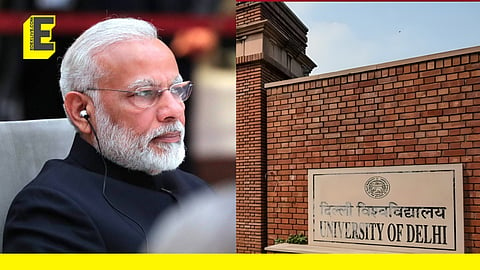

In response to a petition in the Delhi High Court raising questions about Prime Minister Narendra Modi’s education qualifications, the Delhi University (DU) has argued that “mere curiosity is not a valid reason to seek information under the Right to Information (RTI) Act.”
The statement was made in response to a petition seeking access to records of students who passed the BA programme in 1978, the year when Prime Minister Narendra Modi is said to have completed his degree.
Here’s what happened
As per a report by LiveLaw.in, Solicitor General of India (SGI) Tushar Mehta, representing DU, contended that the RTI Act cannot be misused to access the personal information of individuals without a legitimate public interest.
“Here is a case where a stranger walks into the RTI office of University and says, out of 10 lakh students, give me degree of X. The question is whether anyone can walk in and ask for degrees of others?” Mehta said.
He further distinguished between public interest and public curiosity, asserting that widespread interest in a matter does not automatically make it one of public importance.
Mehta also raised concerns about the misuse of RTI laws, arguing that the Act was meant to promote transparency in governance and not to satisfy individual curiosity.
“RTI activist is a designation by itself. People now have visiting cards. It is a designation by itself, a profession. I am not going into it but this Act serves good purpose but it has its pitfalls and it is being misused,” he said.
On the other side, Senior Advocate Sanjay Hegde, representing RTI applicant Neeraj Kumar, argued in favour of disclosure. He pointed out that such academic records were traditionally published by universities and made available on notice boards, university websites, and even newspapers.
He asserted that academic qualifications are fundamental information that influence decisions in employment, higher education, and even personal matters like matrimonial alliances.
Hegde also countered DU’s claim that academic records are held in a fiduciary capacity, arguing that university-generated records do not qualify as confidential personal information. He reasoned that marks, passing status, and degree details are produced by the university itself and do not constitute private, pre-existing information entrusted by a student.
About the case
The petition (University of Delhi v. Neeraj Kumar) stems from an RTI application filed by activist Neeraj Kumar, who sought details of all students who appeared for the BA exams in 1978, including their roll numbers, names, marks, and pass/fail status.
The Central Public Information Officer (CPIO) of Delhi University denied the request, citing that it involved third-party personal data. However, the CIC ruled in 2016 that the educational records of students should be considered public information and ordered their disclosure.
As the matter stands, the Delhi High Court is set to hear further arguments next week, with submissions from other petitioners still to be presented.
While DU has expressed no objection to revealing the total number of students who appeared, passed, or failed in 1978, it continues to oppose the disclosure of individual records, added LiveLaw.in.
